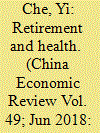| Srl | Item |
| 1 |
ID:
182559


|
|
|
|
|
| Summary/Abstract |
Ageing workforces due to low fertility rates and higher life expectancies challenge modern industrialized economies. In order to secure economic welfare and to balance public budgets, governments worldwide implement reforms to increase the retirement age. The trend towards a higher retirement age confronts defense sectors that for centuries have been in search of an age structure characterized by ‘youth and vigor’. In this article, we study the economic gains to society when the special retirement age for military personnel in the Norwegian Armed Forces is increased. Combining the literatures on pension, personnel, and military economics, we identify mechanisms crucial to the outcome of a special retirement age reform. Monte Carlo simulation is applied to illustrate the potential impact on the economic net gains of uncertain variables. We find that an increase in the retirement age provides substantial net benefits to society, even under fairly negative assumptions about the consequences for retention, motivation and efforts, and the value of elderly personnel in the Norwegian Armed Forces.
|
|
|
|
|
|
|
|
|
|
|
|
|
|
|
|
| 2 |
ID:
161826


|
|
|
|
|
| Summary/Abstract |
One typical feature of China's pension system is that retirement is mandatory. By exploiting the exogenous change created by this mandatory retirement policy, we use the mandatory retirement age as an instrument for retirement status to examine the effect of retirement on individual health using data from the China Health and Nutrition Survey (CHNS). Our main finding is that the probability of “fair” or “poor” self-reported health among white-collar workers decreases by 34 percentage point after retirement. This result is generally robust to different model specifications, alternative measures of health, and different subsamples. In addition, we deliver evidence that increased health-related exercises and the cultivation of a better lifestyle are two possible channels through which retirement affects health.
|
|
|
|
|
|
|
|
|
|
|
|
|
|
|
|